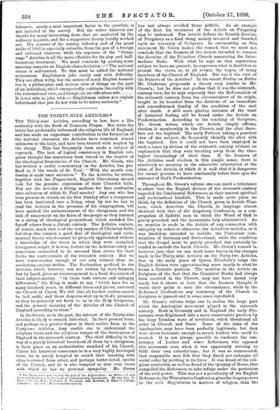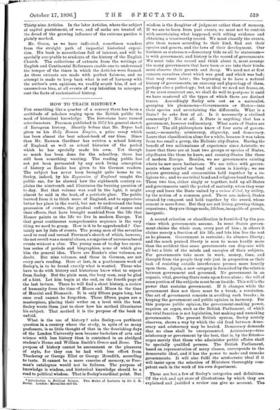THE THIRTY-NINE ARTICLES.*
THE Thirty-nine Articles, according to law, have a like authority with the Book of Common Prayer. But while the latter has profoundly influenced the religious life of England, and has made an important contribution to the formation of the national character, the Articles have remained almost unknown to the laity, and have been treated with neglect by the clergy. This has frequently been made a subject of reproach. The lack of logical consistency in English reli- gious thought has sometimes been traced to the neglect of the theological formularies of the Church. Mr. Green, who has written a useful commentary on the Articles, has pre- fixed to it the words of St. Paul : "With the mouth con- fession is made unto salvation." To the Articles, he writes, together with the Prayer-book, English Churchmen should look for the genuine expression of their Church's faith. But are the Articles a fitting medium for that confession unto salvation of which St. Paul speaks? Any one who has been present in church on the first Sunday after a clergyman has been instituted into a living, when by law he has to read the Articles in the presence of his congregation, will have marked the embarrassment of the clergyman, and the look of amazement on the faces of the people as they listened to a string of theological propositions which sounded like far-off echoes from a distant century. The Articles contain, of course, much that is of the very essence of Christian faith, but they also contain a good deal of theological and eccle- siastical theory which cannot be properly appreciated without a knowledge of the times in which they were compiled. Clergymen might, it is true, lecture on the Articles—they are sometimes counselled to do so—and thus revive for their flocks the controversies of the sixteenth century. But we have controversies enough of our own without thus re- awakening ancient strifes. The Declaration prefixed to the Articles, which, however, was not written by their framers, but by Laud, gives no encouragement to a fresh discussion of their subject-matter. "In these both curious and unhappy differences," the King is made to say, "which have for so many hundred years, in different times and places, exercised the Church of Christ, We will that all farther curious search be laid aside, and these disputes shut up in God's promises as they be generally set forth to us in the Holy Scriptures, and the general meaning of the Articles of the Church of England according to them."
In the future, as in the past, the interest of the Thirty-nine Articles is likely to remain historical. In their present form, and perhaps to a greater degree in their earlier form as the Forty-two Articles, they enable one to understand the religious views and the religions temper of the theologians of England in the sixteenth century. The chief difficulty in the way of a purely historical treatment of them by a clergyman, is their place as an authoritative standard of his Church. Unless his historical conscience is in a very highly developed state, he is sorely tempted to enrich their teaching with ideas borrowed from other, and perhaps better-loved, epochs of the Church, and he is also tempted to slur over views with which he has no personal sympathy. Mr. Green
• The Thirty-nine Arti, les and the A go of the Reformation: an Histmi al and Dectrinat Exposition in the loght of Cont.mporary Documents. By the Rev. E. Tyrre 1 G e M A., TActurer in Theology and Hebrew, S. Davin's Cullege, larapete Lo, don: Wel a Gardner and Co.
has not always avoided those pitfalls. As an example of the first, his treatment of the Article on Purgatory may be instanced. The Article defines the Romish doctrine of Purgatory as a fond thing mainly invented and founded upon no warranty of Scripture. In commenting on this statement Mr. Green makes the remark that we must not conclude that the framers of the Article intended to censure the doctrine of the Primitive Church concerning the Inter- mediate State. With what he says on that mysterious subject we have no quarrel; he expresses what is doubtless at present the views, or, at all events, the hopes, of many members of the Church of England. But was it the view of the framers of the Articles ? In his recent Studies on Butler Mr. Gladstone propounds a theory very similar to Mr. Green's ; but he does not profess that it was the sixteenth- century view, for he says expressly that the Reformation of the sixteenth century, from the circumstances of its origin, taught in its broadest form the doctrine of an immediate and unconditioned finality of the condition of the soul after death. A still more glaring instance of the want of historical feeling will be found under the Article on Predestination. According to the teaching of Scripture, Mr. Green writes, which our Article simply affirms, election is membership in the Church, and the elect there- fore are the baptised. The early Fathers, taking a practical view of the subject, do frequently identify the elect with the baptised. But it could not have been employed in such a sense by divines of the sixteenth century without an explanation that they were breaking away from the theo- logical terminology of their time. If the framers of the Articles used election in this simple sense, there is absolutely no meaning in the admirable exhortation at the close of the Article, in which it is said that it is dangerous for carnal persons to have continually before their eyes the sentence of God's Predestination.
Throughout Mr. Green's volume one can mark a reluctance to admit that the English divines of the sixteenth century regarded the Continental Reformers as their nearest spiritual and ecclesiastical kinsfolk. This is made quite plain, we think, by the definition of the Church given in Article Nine- teen, which describes the Church, in language almost identical with that of the Augsburg Confession, as a con- gregation of faithful men in which the Word of God is purely preached and the sacraments drily administered. As no mention is made in the Article of any connection with antiquity by orders or otherwise, the definition includes, as it was doubtless intended to include, the Protestant com- munities of Germany and Switzerland; while the condition that the Gospel must be purely preached was certainly in- tended to exclude the Latin Church. Mr. Green's remark is, however, just, that we can mark some traces in the changes made in the Thirty-nine Articles on the Forty-two Articles, that in the early years of Queen Elizabeth's reign the English divines were approximating more nearly to what he terms a Catholic position. The mention in the Article on Scripture, of the fact that the Canonical Books had always been received in the Church, may not have meant very much, but it shows at least that the framers thought it worth their pains to note the circumstance, while in the Reformed Confessions any testimony of the Church to Scripture is ignored and in some cases repudiated.
Mr. Green's volume helps one to realise the large part which the Anabaptist movement played in the sixteenth century. Both in Germany and in England the early Pro- testants were frightened into a more conservative position by the huge formless wave of revolution, which threatened all order in Church and State. Some of the aims of the Anabaptists may have been perfectly legitimate, but they were never fortunate enough to secure leaders who could be trusted. It is not always possible to vindicate the con- sistency of Luther and other Reformers, who opposed this movement even when it was apparently striving to fulfil their own exhortations ; but it was so unmeasured, that responsible men felt that they dared not endanger all social order by yielding to its force. It was dread of the reli- gions revolution, as well as dread of the tyranny of Rome, that compelled the Reformers to take refuge under the protection of the civil power. This was not a peculiarity of the English Reformers; the Westminster Confession gives far larger powers to the civil Magistrates in matters of religion, than the Thirty-nine Articles. In the later Articles, where the subject of capital punishment, of war, and of oaths are treated of, the dread of the growing influence of the extreme parties is plainly marked.
Mr. Green, as we have indicated. sometimes wanders from the straight path of impartial historical exposi- tion. His book is nevertheless full of interest, and will be specially acceptable to students of the history of the English Church. The collections of extracts from the writings of English and Continental Reformers enable one to understand the temper of the times in which the Articles were framed. As these extracts are made with perfect fairness, and no attempt is made to keep back what is out of harmony with the author's own opinions, we readily acquit him, if not of unconscious bias, at all events of any intention to misrepre- sent the facts of ecclesiastical history.







































 Previous page
Previous page